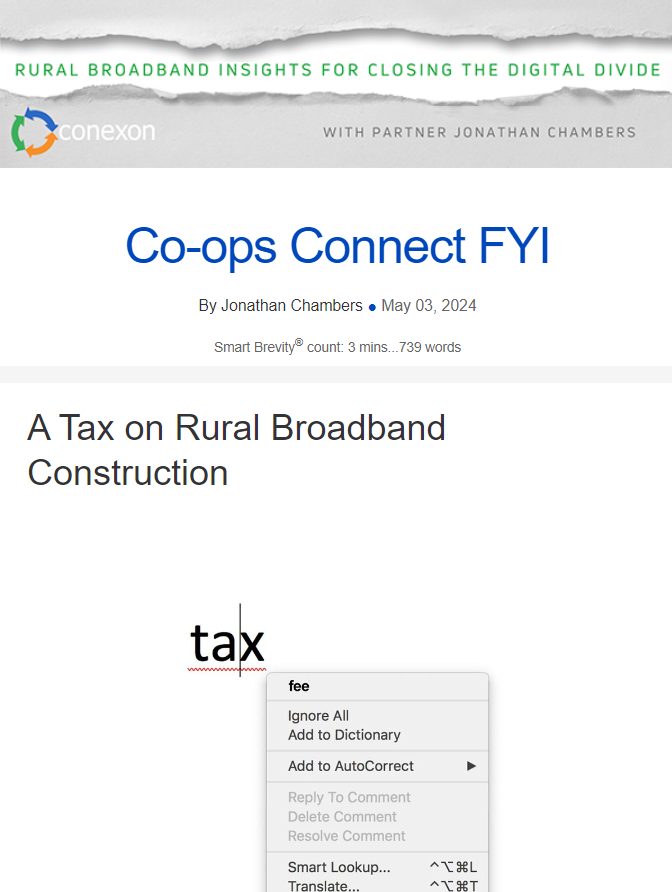A Tax on Rural Broadband Construction
May 3, 2024
I received an email this week from a friend, which read in part:
“Hearing our ARPA funding is a taxable event. Any insight?”
I have a long-running dispute with another friend about whether I am as anti-government as I often sound. I believe I am against bad government policy, and an awful lot of government policy is bad policy, so it only seems like I am an anti-government crank.
The issue at stake:
The tax policy with respect to broadband grants and subsidies is, I believe, another bad policy.
- The ARPA and BEAD programs were created because Congress concluded funding was necessary in rural areas of the country to facilitate the construction of broadband networks.
- Without funding or other government support, it is not economical for companies to build networks and provide services that are available throughout other areas of the country.
- That is good government policy, which has been used for over a century to justify public spending and other government support for telecommunications networks.
Yes, but:
- In the past, telecommunications subsidies have been considered revenue by the IRS, and therefore taxable.
- The Treasury Department issued guidance for the ARPA programs that deemed ARPA grants taxable.
- For BEAD grants, Congress introduced the Broadband Grant Tax Treatment Act (BGTTA) to amend the tax code so that these grants would not be taxed. So far, BGTTA, and other efforts, have failed.
The big picture:
To account for the additional tax burden, as many have pointed out, companies will need more in funding.
- If taxed, government dollars do not go as far — undermining the very goal of the policy.
By the Numbers

One example, step by step:
- Assume you had perfect knowledge of the cost of your broadband network construction, operating expenses, and revenue.
- Let’s say you calculate that your broadband network requires $10 million and, due to the economics of a sparsely populated area, you need a $5 million grant. Before taxes.
- With a federal corporate tax rate of 21% and a median state corporate tax rate, let’s say you must pay 27.5% in taxes on the $5 million grant.
- If you need $5 million and will be taxed at a 27.5% rate, then to net $5 million (the additional grant funds will also be treated as income), you will need $6,896,552, or nearly 69% of the total project cost.
- Thus, a BEAD applicant for a $10 million construction project could apply for $6.9 million. All good.
- But for most, if not all, areas encompassing BEAD-eligible locations, more than 50% of a project’s cost will be necessary.
- The remaining BEAD-eligible locations are in the most sparsely populated areas of the country.
- Think of geographies with fewer than five homes per mile. In such areas, a grant for 50% of the construction funds likely will be insufficient.
- Given BEAD’s requirement that recipients provide a 25% match, you might get a $7.5 million grant for a $10 million network construction project.
- With the tax burden, you need to apply for $10,344,828.
- But, you can’t apply for more than $10 million for a $10 million project – unless you can include the taxes.
The Final Word

One potential solution:
Maybe you can include the taxes in the application.
- We’ve applied for and received dozens of ARPA grants for network construction. I don’t recall a line item for tax reimbursement.
- Make-ready labor and materials, mainline labor and materials, service drops, electronics, telecommunications huts, splitters, splicing, grant preparation cost — I can think of multiple categories. But maybe we should start including a line for tax reimbursement.
- Or, better yet, maybe our 25% cash contribution can be the tax payment on the grant. That math almost works.
The bottom line:
Without some adjustment, as with other structural problems with the program, BEAD doesn’t work for the very areas of the country that most need support.
⏳ Join me for Conexon’s A Time to Build webinar series!
With $42B in BEAD on its way, is your co-op poised to ensure a broadband future for 100% of your members?
The series will unpack the BEAD landscape, explain why now is the time to build, and spotlight co-op guests who have set the stage for reaching 100% of members.
First webinar is Thursday, June 6! Register now
